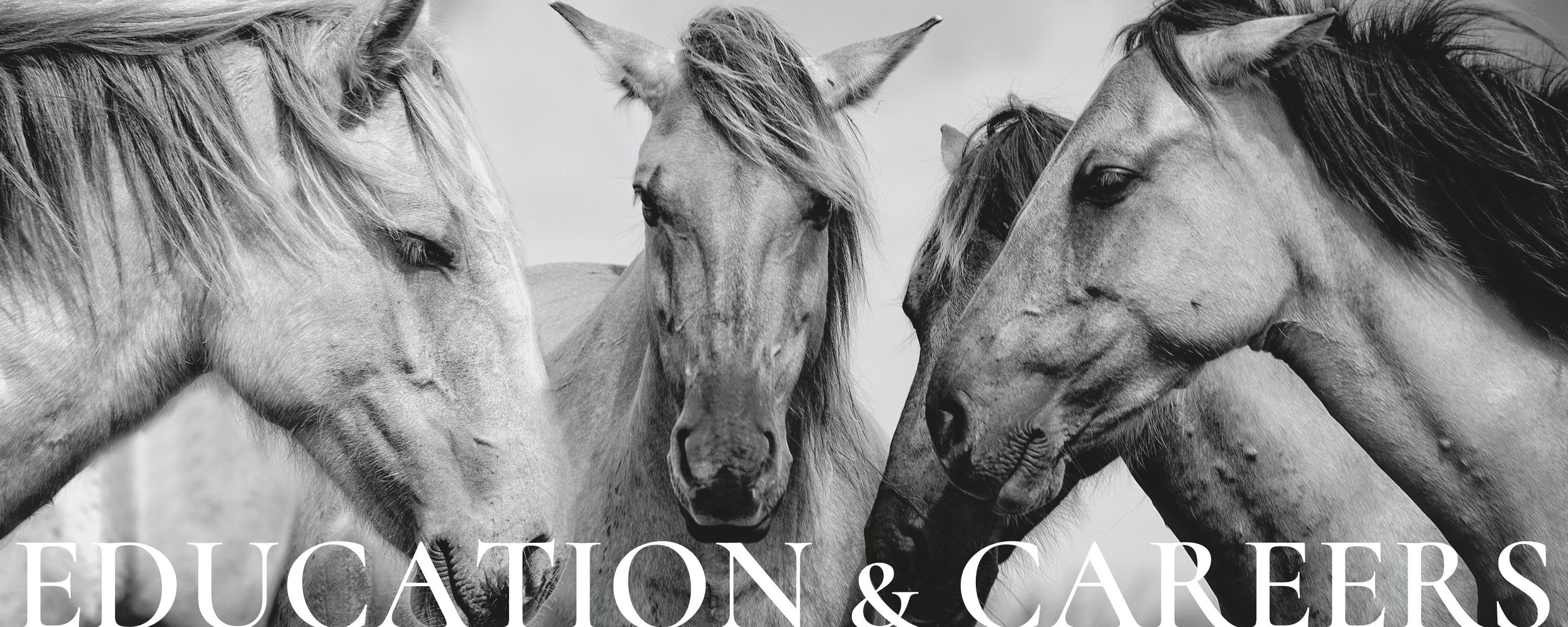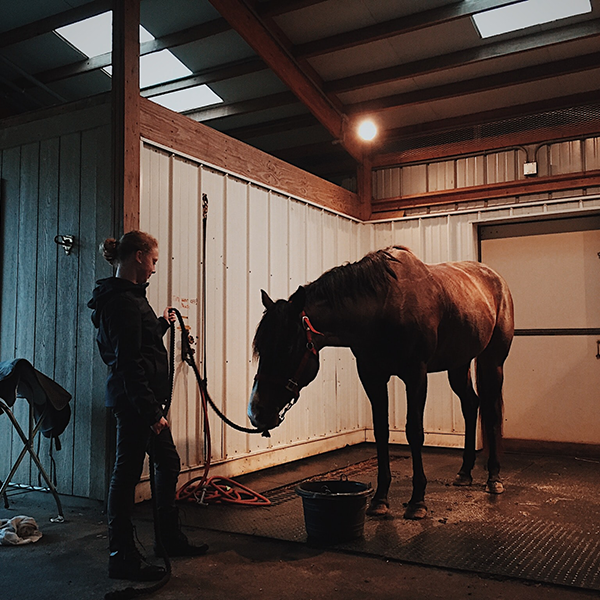Equine Educational programs for youth, teens and young adults. Learning more than just riding.

Young riders are the future of the sport and horse industry. Learning to ride is a clear staple for young riders; however, educating youth in daily horse care management is just as important as riding. There are many programs that instill education as a foundation for young riders, and these programs highlight the importance of unmounted lessons just as much as mounted riding lessons. Through the United States Equestrian Foundation, USEF, there are many affiliated and partnered programs that introduce young riders to many different breeds and disciplines.
Riding horses can be extremely time consuming for young riders, not leaving much time for additional extracurricular activities outside of school. Sometimes young riders can miss out on a team setting when learning to ride. Fortunately, many grade schools, secondary schools, and colleges have incorporated riding teams and clubs for young riders. Interscholastic Equestrian Association, IEA, and Intercollegiate Horse Show Association, IHSA, are leading team organizations that allow young riders to compete and ride on a national level, while encouraging team camaraderie.
IEA and IHSA offer multiple disciplines to compete in including Hunt Seat, Western and Dressage. IEA was established to provide competitive and educational opportunities to equestrians. IEA states: “It is the responsibility of all attendees to foster a spirit of belongingness, an atmosphere of community enjoyment, and a mutual respect for all participants and their equine partners.”
IHSA’s mission is “to provide equestrian competition for all college and university students regardless of riding level, gender, race, sexual orientation or financial status. The IHSA is dedicated to promoting sportsmanship, horsemanship and academic excellence.”
It is important to both associations to provide riders with opportunities to further their education in equine sports and equine related matters. They strive to promote the common interests of riding, encourage good horsemanship, sportsmanship and education in all matters related to the horse industry. In many ways IEA is a stepping block for middle and secondary school aged youth to form a solid education and positive competitive spirit while moving on to IHSA college riding teams, and college educational programs. There are several grants and scholarships available to IEA and IHSA riders.
Catie Beth Varian, Regional President of IEA and IHSA and Assistant Trainer at Hunters Edge Stables in Collierville, Tenn. emphasized how IEA and IHSA, are important in teaching young riders how to support team members and help teach leadership skills through a team setting.
“What is great about IEA and IHSA is the team setting. It is open to everyone; A-circuit riders to kids who have never ridden before.” said Varian.
By working as a team, IEA and IHSA teach young riders important life skills and horsemanship from the basics of catching and leading horses, to properly cleaning tack, grooming and horse health.
“Everyone pitches in to help, and everyone can learn from everyone, whether they are older or younger,” Varian said.
IEA and IHSA’s competitions help teach sportsmanship. Riders learn how to win and lose as a team. With the wins and the loses it teaches riders to accept outcomes gracefully which teaches valuable life lessons and helps prepare individuals for jobs and careers. To learn more about IEA and IHSA visit these websites: www.rideiea.org and www.ihsainc.com
Another well known educational program is 4-H. The mission of 4-H is to give all young people access to opportunity. According to 4-H.org “kids and teens complete hands-on projects in areas like health, science, agriculture and civic engagement in a positive environment where they receive guidance from adult mentors and are encouraged to take on proactive leadership roles. Kids experience 4‑H in every county and parish in the country through in-school and after-school programs, school and community clubs and 4‑H camps.”
While 4-H is not limited to only agriculture and equestrian sports the program is well known to help educate young riders in areas of horsemanship, farm management, sportsmanship and time management.
Maleigha Cook, 4-H County Extension Agent at Arkansas Cooperative Extension Service in Jonesboro, Ark. said, “4-H is open to everyone. It is free to join and to get involved. It creates well rounded children by shaping communication skills through public speaking projects, interviewing processes and resume building.”
There are several different types of 4-H programs. All programs are backed by a network of 100 public universities and an extensive community of volunteers and professionals. 4-H programs are designed to be hands-on learning where kids can build confidence, creativity and curiosity with like-minded friends and mentors. 4-H strives to build life skills such as leadership and resiliency to better prepare youth for careers.
Cook credits 4-H with better preparing youth for college: “It definitely helps shape 4-Hers future career path. When these kids go to college their communication skills and knowledge base is above and beyond other students. 4-H teaches kids how to take issues at hand, and overall management of their time. It definitely helps kids take an interest in animal sciences and agriculture careers.”
Many careers that 4-Hers become interested in are County Extension Agent positions where they can work hands on with local farmers of crops, cattle, sheep, poultry and more. Veterinary Medicine is also a common career path pursued by 4-Hers along with specialty careers such has animal laboratory technicians, specialized agriculture law, and Equine Theriogenology which specializes in equine reproduction.
4-H also promotes civic and community involvement. It is important for 4-Hers to learn how to serve and give back to their communities, whether it is an urban or rural community. All 4-Hers have civic involvement projects they complete. This teaches the importance of building community and working with others.
Outside of the educational programs, 4-H offers horse shows and competitions throughout the nation. Cook said, “kids can compete at the very beginner levels, all the way up to a national level. There is a place for anyone interested in horses.” 4-H also has team competitions where the team competes which teaches camaraderie and sportsmanship between members. To learn more about how to get involved with 4-H contact your county extension agent.
The Unites States Pony Club was formed in 1954. Pony Club’s major focus is to teach riding and proper horse care to all members. The United States Pony Club’s mission is “an educational organization which builds the foundations of teamwork and sportsmanship through riding, mounted sports, care of horses and ponies, while developing and enhancing leadership, confidence, responsibility, and a sense of community in its youth and adult members.”
Jocelyn Atkinson and Kim Clark are Co-DCs of the West Tennessee Pony Club. Atkinson explained how important pony club is for educating young riders. “It is a full education. Kids get tested on both riding and horsemanship and overall knowledge of the horse.”
Pony Club caters to eventing. Riders and their horses cross-train in Dressage, Cross Country and Show Jumping disciplines. Pony Club’s main core values are:
“Horsemanship with respect to healthcare, nutrition, stable management, handling and riding a mount safely, correctly and with confidence.
Organized teamwork including cooperation, communication, responsibility, leadership, mentoring, teaching and fostering a supportive yet competitive environment.
Respect for the horse and self through horsemanship; for land through land conservation; and for others through service and teamwork.
Service by providing an opportunity for members, parents, and others to support the Pony Club program locally, regionally and nationally through volunteerism.
Education at an individual pace to achieve personal goals and expand knowledge through teaching others.”
West Tennessee Pony Club meets twice a month for unmounted educational meeting where they discuss topics like hoof health, proper wrapping techniques, overall horse health care and tack care. And for a mounted meeting where they work with different clinicians and trainers in the mid-south area to practice dressage and jumping techniques.
“Our kids learn how to be 100% responsible for themselves and their horses. They learn proper grooming and impeccable turnout for shows. They start learning proper horse care practices as young as age six. They learn about deworming and different types of parasites, heat management and how to properly cool down horses. They are able to recognize colic in horses and how to treat sport injuries. They learn the highest levels of horse management and carry that knowledge with them into professional careers,” Atkinson said.
Pony Club is open to all ages, starting as young as six, children and adults can join their area pony clubs by visiting www.ponyclub.org and searching for a club in their area. Parents and adults can also reach out directly to local club leaders. To learn more about West Tennessee Pony Club visit their Facebook page: https://www.facebook.com/www.westttnponyclub.org/.
There are many programs and associations that focus on the importance of horsemanship, sportsmanship, horse health care, time management and farm management. Learning more about different opportunities in the region can help children, parents and young adults decide which programs are best for their needs. To learn more about several different types of programs available visit www.usef.org.








